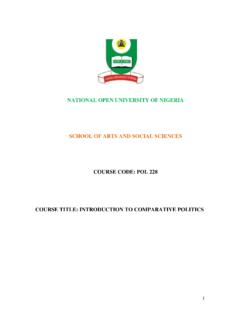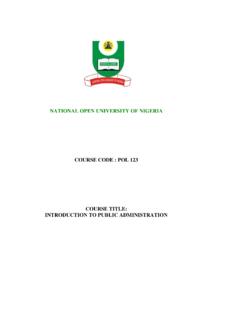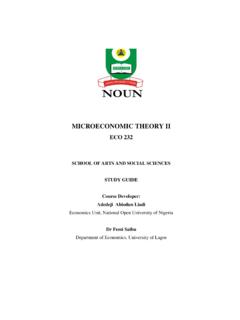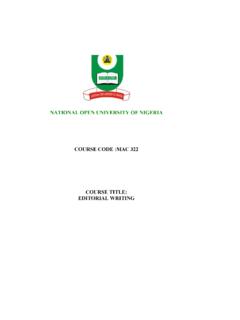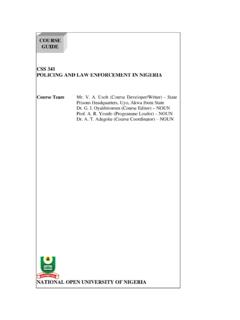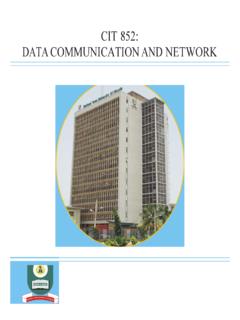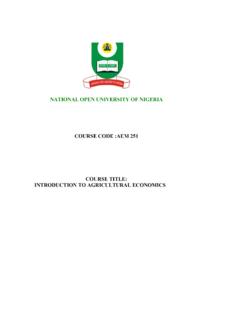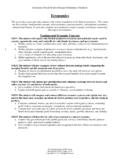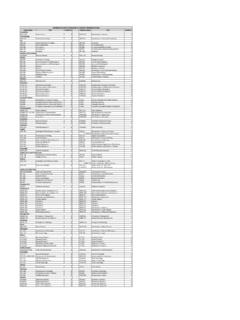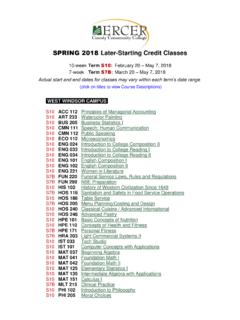Transcription of NATIONAL OPEN UNIVERSITY OF NIGERIA SCHOOL …
1 NATIONAL OPEN UNIVERSITY OF NIGERIA . SCHOOL OF MANAGEMENT SCIENCES. COURSE CODE: MGS 719. COURSE TITLE: PRINCIPLES OF MICRO ECONOMICS. 1. NATIONAL OPEN UNIVERSITY OF NIGERIA . SCHOOL OF MANAGEMENT SCIENCES. 14/16 Ahmadu Bello Way, Victoria Island Lagos. MGS 719: PRINCIPLE OF microeconomics . COURSE GUIDE. Course Developers: 1. Mr. AGBEBAKU, HENRY USIOBAIFO. NATIONAL Open UNIVERSITY of NIGERIA , 2. Mr. Abdullahi, S. Araga NATIONAL Open UNIVERSITY of NIGERIA , Unit Writers: 1. Mr. AGBEBAKU, HENRY USIOBAIFO. NATIONAL Open UNIVERSITY of NIGERIA , 2. Mr. Abdullahi, S. Araga NATIONAL Open UNIVERSITY of NIGERIA , Course Editor: Programme Leader: Dr. C. I. OKEKE. NATIONAL Open UNIVERSITY of NIGERIA , Course Coordinator: Mr.
2 ABIANGA, U. EMMANUEL. NATIONAL Open UNIVERSITY of NIGERIA , Victoria Island, Lagos. 2. INTRODUCTION. AEM721: Introduction to Principle of microeconomics is a two credit course for the Post Graduate Diploma in Business Administration Programme. The course consists of sixteen (16) units grouped into four (4) modules. The material has been developed to suit Post -graduate Diploma Students in Business Administration at the NATIONAL Open UNIVERSITY of NIGERIA (NOUN) by adopting an approach that highlights the key areas of microeconomics . The course guide tells you briefly what the course is all about, what course materials you will be using and how you can work your way through these materials.
3 It suggests some general guidelines for the amount of time you are likely to spend on each unit of the course in order to complete it successfully. It also gives you some guidelines on the Tutor Marked Assignments. COURSE AIMS. The course Principle of microeconomics ' aims to give you an understanding of the techniques in administering and managing business organisations with necessary skills. COURSE OBJECTIVES. The objectives of the course are to: 1. Explain in detail microeconomics as a branch of Economics. 2. Examine the foundations of microeconomics . 3. Analyse the basic microeconomic theory. 4. Examine critically the concept of market structure in abstraction and in real life situation.
4 5. Critically examine privatization and commercialization in NIGERIA . In addition, each unit also has specific objectives and Self-Assessment Exercise. The units' objectives are also included at the beginning of a unit; you should read them before you start working through the unit. You may want to refer to them during your study of the unit to check on your progress. You should always look at the unit objectives after completing a unit, in this way, you can be sure that you have done what is required of the unit. WORKING THROUGH THIS COURSE. To complete this course, you are required to read the study units, read related books and read other materials provided by the NATIONAL Open UNIVERSITY of NIGERIA (NOUN).
5 Each unit contains self- assignment exercises, and at certain points during the course, you will be expected to submit assignments. At the end of the course is a final examination. The course should take you about a total of 3. about 16 weeks to complete. The course is of four modules; microeconomics as a Branch of Economics, Foundations of microeconomics , Microeconomic Theory, and Market Structure. Below are the components of the course, what you have to do and how you should allocate your time to each unit in order to complete the course successfully on time. COURSE OUTLINE PROGRAMME PROPOSAL (OPP) FOR AEM 721. This course is designed to give students a broad view of what Principles of microeconomics is all about.
6 The contents are to the emergence of business administration; problems of households, business firms and government in the business world, the economic systems and social change. The basics of business policy formulation and implementation process by individuals, firms and government in business administration. COURSE MATERIALS. Major Components of the course are: 1. Course guide;. 2. Study units;. 3. Textbooks;. STUDY UNITS. The study units in this course are as follows: MODULE 1: INTRODUCTION TO THE CONTEX OF microeconomics . Unit 1: Introducing Economics Unit 2: Basic Tools in Economic Analysis Unit 3: microeconomics Unit 4: microeconomics and Choice Unit 5: Economic Systems and Organisation MODULE 2: FOUNDATIONS OF microeconomics .
7 Unit 6: Theory of Demand Unit 7: Theory of Supply Unit 8: Elasticity 4. MODULE 3: INTRODUCTION TO MICROECONOMIC THEORY. Unit 9: The Theory of Consumer Behaviour Unit 10: Theory of Cost MODULE 4: MARKET STRUCTURE. Unit 11: Perfect Competition Unit 12: Monopoly Unit 13: Monopolistic Competition Unit 14: Oligopoly Unit 15: Pricing and employment of Resources Unit 16: Privatisation and Commercialisation in NIGERIA ASSESSMENT. There are two aspects to the assessment for this course: The first is the Tutor-Marked Assignment; and secondly, the e-examination. Within each unit are self-assessment exercises, which are aimed at helping you to check your assimilation as you proceed. Try to attempt each of the exercises before finding out the expected answers from the literature.
8 TUTOR-MARKED ASSIGNMENT (TMA's). This is your continuous assessment exercise and its accounts for 30% of your total score. You are expected to answer at least four set of TMA's questions, before you sit for the end of course examination. Your best three TMA's will account for the 30% total score. FINAL EXAMINATION AND GRADING. 5. Your course examinations' would earn you 70% which would be added to your TMA score (30%). The time for this examination would be communicated to you. SUMMARY. This course, Principles of microeconomics is designed to give you some knowledge which would help you understand the basic fundamentals, principles and objectives of microeconomics as applied to individuals, business firms and government.
9 After going through this course, you would be in a good position to pass your e-examination at the end of the semester and programme, the knowledge gained could be applied in the execution of managerial duties and to contribute to the development of scholarly thoughts in business/ industrial sector management. We wish you success in this interesting course and hope you will use what you have learnt, in this Post- graduate diploma Programme as a gateway to Master's degree program in business/industrial sector management/administration. REFERENCES/FURTHER READING. Here are some references for further reading that can assist you. At the end of each unit, you will see a list of references related to the topic treated.
10 Abe , (2000), Intermediate Economics, Mipon Biz. Centre, Lagos John, Sloman and Alison Wride, (2009), Economics, Seventh Edition, Rotolito Lombarda, Italy. Paul, A. Samuelson and William, D. Nordhaus (2005), Economics; Eighteenth Edition; Published Mcgraw-Hill International Edition. Paul, R Krugman and Maurice Obsfeld (2009), International Economics Theory and Policy: Elm St. Publishing Services; 8th Edition. Wale, O. and kunle, W., (2002), Introduction to microeconomics and Application of Differentials Calculus to Economics, Leo Prints NIGERIA Ltd. 6. NATIONAL OPEN UNIVERSITY OF NIGERIA . SCHOOL OF MANAGEMENT SCIENCES. 14/16 Ahmadu Bello Way, Victoria Island Lagos COURSE DEVELOPMENT.
